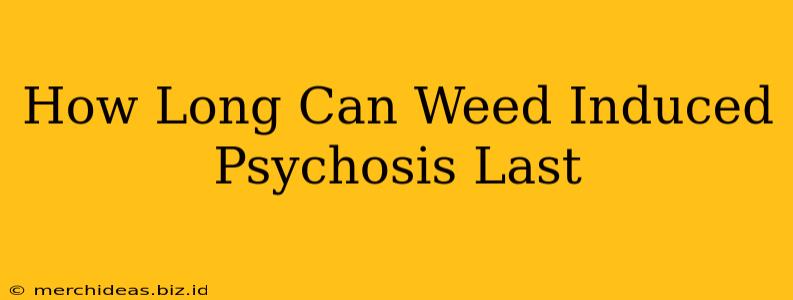Cannabis, while legal in many places, isn't without its potential risks. One serious concern is the possibility of developing cannabis-induced psychosis. This isn't a common occurrence, but it's crucial to understand its duration and potential consequences. So, how long can weed-induced psychosis last? The answer, unfortunately, isn't straightforward.
Understanding Weed-Induced Psychosis
Before delving into duration, let's clarify what we mean by weed-induced psychosis. It's a temporary state of psychosis triggered by the use of cannabis, particularly high-potency strains with high THC levels. Symptoms can include:
- Hallucinations: Seeing or hearing things that aren't there.
- Delusions: Holding fixed, false beliefs.
- Disorganized thinking: Difficulty forming coherent thoughts and speech.
- Paranoia: Intense feelings of suspicion and distrust.
- Disorientation: Feeling confused about time, place, or identity.
- Anxiety and fear: Overwhelming feelings of unease and dread.
It's important to distinguish weed-induced psychosis from pre-existing conditions. Individuals with a predisposition to psychosis might be more vulnerable to experiencing these symptoms after cannabis use. If you have a family history of mental illness, you should exercise extra caution with cannabis use.
Duration of Weed-Induced Psychosis: A Variable Picture
The duration of weed-induced psychosis varies significantly depending on several factors:
- Individual susceptibility: Some individuals are more resilient than others.
- Frequency and amount of cannabis use: Heavy, frequent use increases the risk and potential duration.
- Potency of cannabis: High-THC strains are more strongly linked to psychosis.
- Pre-existing mental health conditions: Underlying vulnerabilities can prolong the episode.
- Treatment and support: Seeking professional help can significantly shorten the duration.
In some cases, symptoms might resolve within days or weeks after ceasing cannabis use. However, in other instances, it can last for several weeks or even months. In rare cases, prolonged or recurring episodes might indicate a more serious underlying mental health issue requiring ongoing treatment.
When to Seek Immediate Help
If you or someone you know experiences any of the symptoms listed above after cannabis use, seek immediate medical attention. This is especially crucial if:
- Symptoms are severe or worsening.
- Symptoms are accompanied by self-harm or suicidal thoughts.
- The individual is unable to care for themselves.
Long-Term Effects and Recovery
While most individuals recover fully, some might experience lingering effects, particularly if the psychosis was severe or prolonged. These can include:
- Persistent anxiety or depression.
- Difficulties with concentration and memory.
- Social withdrawal.
Professional support, including therapy and medication, can play a vital role in recovery. This support is essential to address both the immediate symptoms and potential long-term consequences.
Prevention and Risk Reduction
The best approach to preventing weed-induced psychosis is to:
- Avoid or limit cannabis use, especially high-potency strains.
- Be aware of your family history of mental illness.
- Maintain a healthy lifestyle with adequate sleep, diet, and stress management.
- Seek professional help if you experience any concerning symptoms.
This information is for educational purposes only and does not constitute medical advice. Always consult with a healthcare professional for any health concerns or before making any decisions related to your health or treatment. They can provide accurate diagnoses and personalized recommendations based on your individual circumstances.
